People had known for years that Paisios was a saint. 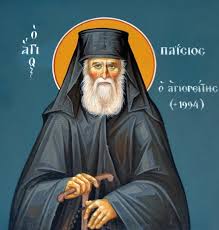 Here is how the Orthodox system works: Veneration of a holy man or woman grows and grows and sometimes there are miracles, till finally somebody at the top says OK, it’s obvious we’ve got a saint here. So finally on January 13, 2015, Elder Paisios of Mount Athos was formally canonized by the Patriarch of Constantinople.
Here is how the Orthodox system works: Veneration of a holy man or woman grows and grows and sometimes there are miracles, till finally somebody at the top says OK, it’s obvious we’ve got a saint here. So finally on January 13, 2015, Elder Paisios of Mount Athos was formally canonized by the Patriarch of Constantinople.
Saint Paisios, in his unique way, was like the ascetic wonder-workers of old. Well, actually there are also many contemporary ones. *
- Read the little book Precious Vessels of the Holy Spirit : the lives and counsels of contemporary elders of Greece
by Herman Middleton
Paisios was born in the village of Farasa in Asia Minor, baptized Arsenios. He came to Greece as part of the Greek exodus from Turkey in 1924 and was trained as a carpenter. During the Greek civil war he was a radio operator, which is why later he often taught using radio analogies – for example, If you want to get God’s attention so he’ll hear you during prayer, “turn the dial to humility”.
Arsenios often put himself in danger in place of his fellow soldiers, saying they had families and and he didn’t. After the war he went home to get his sisters suitably settled, then in 1950 went to Mount Athos. He maintained silence as much as possible, often worked while others rested, and loved to read, especially the lives of saints. 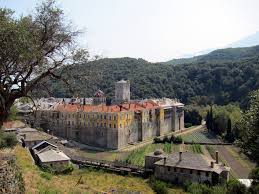 He was made a monk at Philotheou Monastery left and given the name Paisios.
He was made a monk at Philotheou Monastery left and given the name Paisios.
Monk Paisios took an attitude which seemed very strange to others: He held that his own spiritual failures and lack of love were the cause of his neighbors’ shortcomings as well as the world’s ills. So he pushed himself to great self denial and fervent prayer for the sake of the world. Later during the First Iraq War he withdrew almost entirely and devoted himself to prayer about the situation.
Paisios always sought a good reason for people’s actions rather than judging them. Pilgrims to Athos had been scandalized by a certain monk and asked Paisios to get involved. He said Don’t judge him, because the monk was actually virtuous, just playing the fool when visitors came so as to preserve his silence. This was very likely not true.
In 1958 Paisios went home to his village to support the faithful against some Protestants who were proselytizing. Then he went to the Sinai for 2 years. The Bedouins loved him: he made wooden handicrafts, sold them and gave the proceeds to the Bedouins for food. In 1964 he returned to Athos, to a hermitage right on the far southern tip of the peninsula. In 1968 his health caused him to go to Thessaloniki for lung surgery, but he then returned to his monastery on Mount Athos.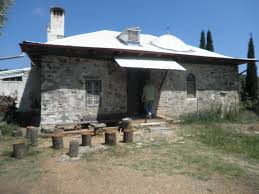
It was now that his fame as an Elder * began to grow. Pilgrims came to him for counsel and healing. At night he prayed, sleeping only two or three hours. His health was still poor so he went back to Thessaloniki for treatment, staying at Souroti women’s monastery. His cell there is to the left. Here pilgrims came in great numbers all day long, and for the next 26 years till his death he turned no one away, even when he was suffering from cancer and in great pain. He said God is greatly pleased when someone who is suffering does not complain but uses what energy he has to pray for and help others. That really is all there is to be said about the rest of his life.
- a spiritual father with special gifts, the same as a “starets” in Russia
Elder Paisios received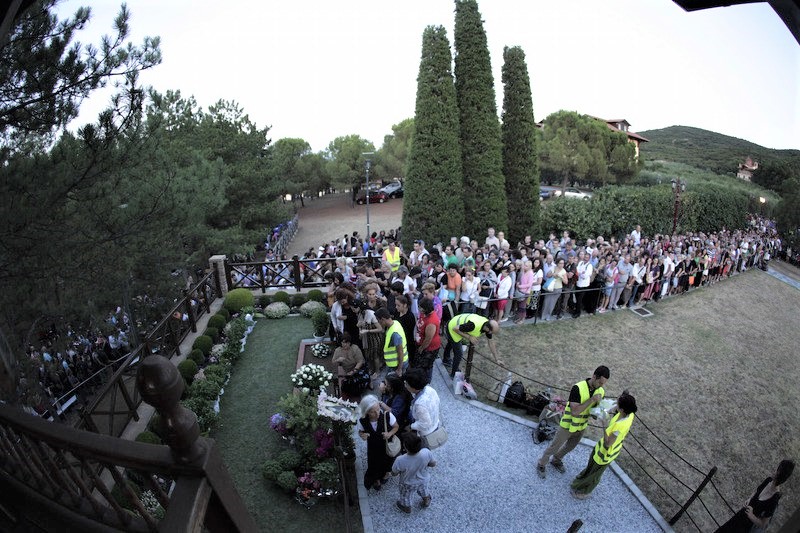 the Holy Eucharist for the last time on July 11, 1994. He died peacefully on July 12 and is buried at Souroti Monastery, where thousands visit his grave each year.
the Holy Eucharist for the last time on July 11, 1994. He died peacefully on July 12 and is buried at Souroti Monastery, where thousands visit his grave each year.
Greece had a series of remarkable elders during the 20th century, wise and gifted spiritual guides, but none has captured peoples’ hearts and minds more around the world than Father Paisios.
Here are ten out of the multitude of sayings of Elder Paisios, plus a few more
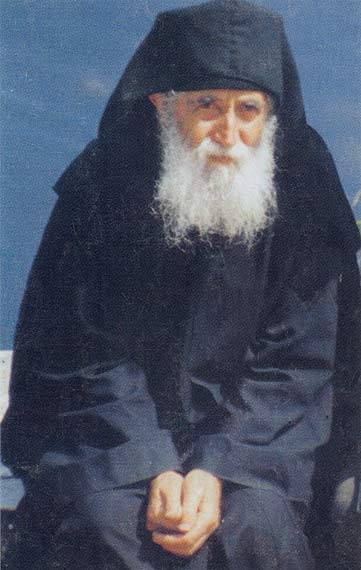 1 Do not look at what people do or examine how and why they do it. Before you do some thing, think what Christ wants you to do; then act accordingly; ask for God’s guidance.
1 Do not look at what people do or examine how and why they do it. Before you do some thing, think what Christ wants you to do; then act accordingly; ask for God’s guidance.
2 In our days people have lost control of their lives and they don’t know what they are doing. They do not wish to be guided. They want to live undisturbed following their own freewill which will eventually bring them to total destruction
3 The person who is possessed by material things is always subjugated to unhappiness and anxiety: on the one hand he trembles for fear they take his things away from him, while on the other he trembles for fear his soul be taken from them. The miser whose hand is sore from his tight hold on things also squeezes his own heart and turns it into stone.
 4 The soft life makes people useless. Without toil and struggle sanctification doesn’t come.
4 The soft life makes people useless. Without toil and struggle sanctification doesn’t come.
5 There are no people more blessed than those who contact the heavenly “television station” and are…tuned into God. In the same way no people are more wretched than those who have cut off contact with God and wander dizzily around the world flipping through the world’s 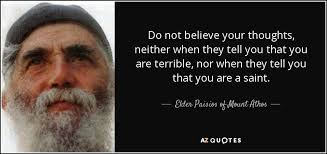 many television stations so as to forget if only for a short time that their lives are off the track.
many television stations so as to forget if only for a short time that their lives are off the track.
6 When asked What good do monks serve when they do not go into the world to help but instead remain in the desert? Paisios replied, recalling his work during the war: Monks are the Church’s radio operators. When they make contact with God through prayer God comes and helps more. One more gun didn’t make a  difference but when the air force came, the battle was decisive.
difference but when the air force came, the battle was decisive.
7 We mustn’t despair when we struggle and see only the slightest progress. We all do nearly nothing, some a little more some a little less. But Christ [makes] our nearly nothing valuable and we can see a little progress. So we mustn’t despair but hope in God. *
- I got that last quotation off of Instagram! I guess Paisios would approve. I wonder if he knows he’s now on Twitter…
8 Recalling his childhood Paisios said: The holy life of parents instructs the souls of their children so they naturally obey them and grow up with piety and without psychological problems and the children are pleased with their parents. The parents are gladdened by their children in this life and in life eternal where they will once again glory in them
9 Whoever is at peace in this material world and and not concerned about the salvation of his soul is like the senseless birds who don’t make a noise from within the egg and never break the shell and come out to enjoy the sun, the heavenly  flight in the life of Paradise, but instead remain unmoving and die inside the egg shell.
flight in the life of Paradise, but instead remain unmoving and die inside the egg shell.
10 The person who has trust in divine justice is neither upset when treated unfairly, nor seeks his justice; on the contrary, he accepts the false accusations as if they were true, and does not try to convince others that he has been slandered; instead he asks to be forgiven.
There are hundreds more of Paisios’ teachings in the books written about him, and also easily found online.
Elder Paisios’ Character and his Wonder-working
Paisios loved to tell stories. He was funny. He loved to crack jokes. He was clairvoyant, knew all about visitors before they even spoke. Once some very sobre-minded pilgrims arrived to find him bouncing on his bed just to loosen them up! When children were brought to him he hid sweets and chocolates in the flowers so the kids could search for them.
He did healings of various kinds.
And now we come to events that may sound, well, like superstition – but this was the late 20th century, and they were observed and authenticated by people who were there, many of whom are still alive.
Paisios was a friend of wild animals: snakes and bears. Once a man on the way to visit the Elder had killed a snake on the path. When he arrived Paisios cried What did you do to my friend? Another visitor arrived to find a large snake in Paisios’ cell as a welcome guest! (Seems a bit odd, 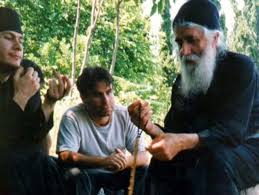 but what do I know?)
but what do I know?)
He foretold the date of the fall of Soviet communism ten years before it happened and the unanticipated Turkish invasion of Cyprus two weeks before it took place. He foresaw a time of trials for Greece – and many other things. However, a warning: Don’t take all his words as prophecy. Saints are not God; they can be wrong. I think his prediction about the Greeks recovering Constantinople seems unlikely- though the way modern history goes, who knows? And when he predicted Armageddon is coming soon… well, people have been doing that forever. But then again…?
Paisios worked wonders. Once he spoke to some French pilgrims in French, though he did not know French.
This is very hard to believe, but it was documented: Paisios could “bilocate”, be in one place, yet somehow “project” himself to another place. (Don’t try this! It’s dangerous unless you’re very holy, which you are not. You might get stuck out there!) People reported that the Elder had been with them in various places to rescue them from accidents or to counsel them, when others near him knew he had not left his cell. When asked about it he denied it all, said somebody was impersonating him, or maybe the Holy Spirit was playing tricks.
Visits from the “Other Side”
The following three stories come from the book The Mountain of Silence by Kyriacos C. Markides, which he had received from “Father Maximos” who knew Elder Paisios. I’d like to add that I spent only four days on Athos, at Karakallou visiting Hieromonk Barnabas (+ memory eternal) who had been chrismated at our Saint Nicholas, Cedarburg. Stories like this sound pretty unlikely as seen from here, but when one is on Athos they seem very natural. I can’t explain it, but things are different there.
1 Paisios said he had once been having difficulties and was at an impasse and had been asking Saint Ephemia for guidance. One morning at 9 there was a knock at the door. “Who is it?” “Ephemia.” “Ephemia?!” “Ephemia.” She came in and sat with him.  They talked for a long time and she helped him. * It couldn’t have been someone imitating Ephemia, since no women are allowed on Athos.
They talked for a long time and she helped him. * It couldn’t have been someone imitating Ephemia, since no women are allowed on Athos.
- This sort of thing is not so very unusual in the Holy Orthodox Church, and occasionally even elsewhere. A few days after the death of C.S. Lewis, J.B. Philips an English Bible translator and author was having difficulties. Philips wrote that as he sat in his living room watching television, he looked up, and there sat Lewis looking hale and hearty as he once had been, who helped him with his problems. This happened twice. Neither man had dabbled in the paranormal.
2 After the Turkish invasion of Cyprus a Cypriot deacon, despondent about the destruction and loss of lives, especially among his relatives, went to visit the Elder. He said Father Paisios asked him to spend the night at his cell saying, I’ll wake you early so we can chant Matins (Orthros). At 2 a.m. Father Paisios woke him and began the service. (Orthros begins very early in monasteries of the Athonite tradition.) At the Fifth Ode of the Canon the chapel was filled with a white-blue light. The flames of the oil lamps became blue as well and began to move in a slow rhythm, and there was a fragrance so lovely he couldn’t describe it. The deacon asked: Father what’s happening? Paisios whispered Be still and say the Jesus Prayer; the Virgin Mary is visiting us. After a while the lamps stopped moving and the light faded and as it faded the deacon said the sorrow and grief also faded from his heart.
3 Father Maximos spoke of a night he was there himself, when “a very subtle wind rushed into the chapel even though the door as well as the window were firmly shut. The lamp in front of the icon of the Holy Virgin [but none of the other lamps] began swinging back and forth… I turned with curiosity toward Elder Paisios trying to figure out what was happening. He signaled to remain quiet as he knelt down and touched the floor with his forehead remaining in that posture for some time. I stood perplexed… while the strange phenomena went on around me. After about half an hour while the lamp in front of 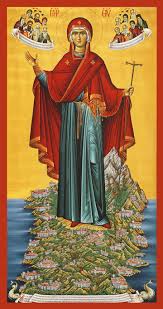 the icon of the Holy Virgin continued its back and forth motion, I resumed reading the service. When I reached the Seventh Prayer of the blessing of Saint Symeon the lamp gradually stopped swinging. The luminosity that had inexplicably filled the room…vanished and everything went back to normal. Elder Paisios stood up and signaled me to follow him outside. What was that all about? I asked him. What? he replied, pretending not to have a clue what I was talking about. That phenomenon in the chapel. What happened? I asked. What did you see? he asked me. I told him everything that took place. He asked me whether I saw anything else. I said no. Oh, he said, it was nothing, it was nothing, waving his hand.” Another night, another visitor, similar happenings. Paisios explained to him that the Theotokos goes around Athos at night checking things out and this time “all she saw here was two idiots saying their prayers”.
the icon of the Holy Virgin continued its back and forth motion, I resumed reading the service. When I reached the Seventh Prayer of the blessing of Saint Symeon the lamp gradually stopped swinging. The luminosity that had inexplicably filled the room…vanished and everything went back to normal. Elder Paisios stood up and signaled me to follow him outside. What was that all about? I asked him. What? he replied, pretending not to have a clue what I was talking about. That phenomenon in the chapel. What happened? I asked. What did you see? he asked me. I told him everything that took place. He asked me whether I saw anything else. I said no. Oh, he said, it was nothing, it was nothing, waving his hand.” Another night, another visitor, similar happenings. Paisios explained to him that the Theotokos goes around Athos at night checking things out and this time “all she saw here was two idiots saying their prayers”.
One last story: In 2001, seven years after Paisios’ death, a man who knew nothing of him was walking to Karakallou Monastery, which is about a mile from Philotheou where Paisios had originally been. It was winter. It began to snow hard and he got lost. He wrote that a man “suddenly appeared and [without asking where I was going] said You’re not going the right direction, follow me. I followed a few steps behind wondering why on earth wasn’t he freezing, since he was so thinly dressed and why his shoes weren’t muddy like mine. I was impressed how quickly he was walking. Along the way he commented: They’re using bulldozers and destroying the paths of the Holy Mountain. I was losing my breath and felt relieved when he finally told me: Follow this path and Christ and our Lady will protect you; I will return to my Skete. It all lasted about ten minutes. When the man arrived at Karakallou no one could imagine why an old monk would be out walking in such a snowstorm. Years later the man saw a photograph of Elder Paisios and said: That’s him. That’s the monk who showed me the way.
In every generation God raises up saints, holy men and women whose work especially in this worldly age is to remind us, to show us that there is 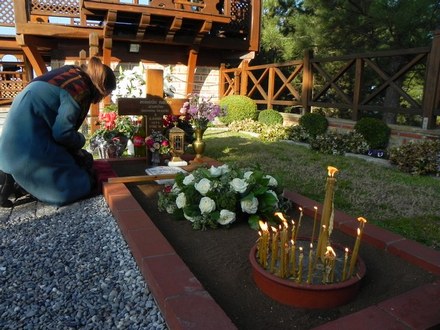 more to life than the material world around us. Some saints do it by living ordinary lives for God, while others live very extraordinary lives for God. Saint Paisios of Athos was one of the extraordinary ones. Get to know him and you will have no doubt about the reality of the World above and beyond us, which also surrounds us here.
more to life than the material world around us. Some saints do it by living ordinary lives for God, while others live very extraordinary lives for God. Saint Paisios of Athos was one of the extraordinary ones. Get to know him and you will have no doubt about the reality of the World above and beyond us, which also surrounds us here.
Holy Elder Paisios, pray to Christ our God to save our souls.
Next Week: Last of the Seven Deadly Sins – Envy

Thank you for reminding us of how we are never without help!
Thanks for this post Father; I had been feeling a little down and hopeless before reading it but feel as though the Saint reached out through your words to help and encourage me!
I love St Paisios. I did find his radio analogies a little unsettling until I learned more of his life. His counsels on family life are invaluable 😀